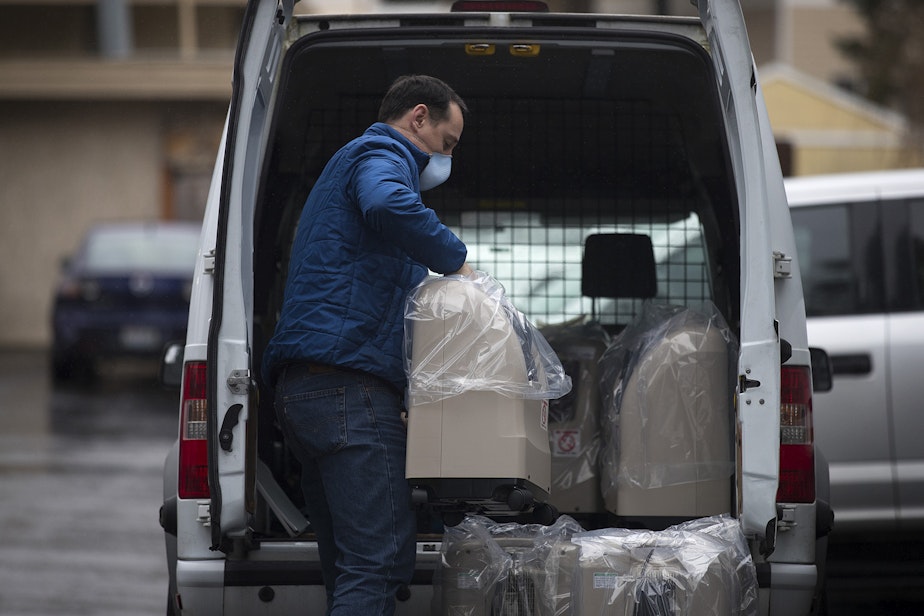Answering your questions on the coronavirus

Host Bill Radke speaks to Dr. Deborah Fuller and Dr. Judith Wasserheit about the coronavirus in Washington state, known as COVID-19.
As of Monday morning, six coronavirus deaths have been reported in Washington State.
There are 17 confirmed cases of coronavirus, or COVID-19, in the state, according to King County officials. Fourteen of the cases are in King County, which includes Seattle, and three are in Snohomish County to the north.
To answer some of your questions on what the coronavirus is, how it's spread, and how to treat it, The Record host Bill Radke spoke to Dr. Deborah Fuller, a professor of microbiology at the UW School of Medicine. He also spoke to Dr. Judith Wasserheit, chair of UW Global Health and co-director of the MetaCenter for Pandemic Preparedness and Global Health Security.
Dr. Wasserheit noted that we have to accept that we are likely to see more cases and more deaths from the virus.
"But the good news is that the vast majority of infections we believe are mild, probably over 80 percent are mild."
Sponsored
And, as Dr. Fuller pointed out, viruses like the coronavirus are not uncommon.
"We are exposed every year to other respiratory viruses and other coronaviruses. There's at least four other types of coronaviruses that have been in the population for many years. It's just they're more mundane. They cause a common cold and we experience them every year. We also experience influenza every year. And sometimes that can be very severe as well. And you know, seeing deaths as a result of this this outbreak... it's the elderly and the most immunocompromised and people with underlying conditions that are usually more susceptible to flu viruses as well as cold viruses. So it's not any worse than what we've seen with previous flu viruses."
But how can you tell if you have COVID-19, instead of just the flu?
Dr. Fuller says the symptoms "are just like flu. So if you think you got the flu, you might have coronavirus."
There are local options for getting evaluated for coronavirus. You can call your doctor directly, or contact Harborview Medical Center.
Sponsored
"Harborview Medical Center would be the best place to contact right now. They can talk to you about your symptoms and potentially even come out to your home and do a test to determine if you're infected."
But, as Dr. Wasserheit said, make sure your symptoms are flu-like, and not just a cold.
"You don't want to have people overwhelming the emergency rooms because that's a great place to pick up other illnesses if you're not careful... So when we see somebody who has a real fever, substantial serious cough, and sometimes muscle aches. That's not just your regular cold."
What about if you're pregnant? Is there anything particular you should do?
We don't know enough about the virus yet to know how it specifically affects pregnant people. But, everyone should be sure to protect themselves.
Sponsored
"They're sort of the kinds of things your mom would tell you. Covering your cough and your sneezes. Washing your hands, but really washing them... Also cleaning off sanitizing surfaces that are commonly used... I think it's really important if you haven't gotten your flu shot this year to get it. And the reason for that is that it offers protection against flu, and that could keep you out of the emergency room or contact with exposure to this infection."
And these measures don't just protect you, they protect the community around you as well.
So just how deadly is the coronavirus?
The short answer is we don't know yet.
"Whenever there is a newly emerging virus or bacterium, the first cases that we see are the most severe cases, because the sick people are the ones who come and seek care. And the people who don't have symptoms or who have minimal symptoms don't come... I think many of us who deal with epidemics all the time feel that as we learn more about this virus, it is likely that the fatality rates will go down."
Sponsored
But even if fatality rates do go down, Dr. Wasserheit says we shouldn't stop researching.
"This is a preview of what we're going to see again and again. The frequency and severity of these outbreaks has increased dramatically over the last 40 years, and we keep dealing with these outbreaks in a one off way... So what is very important for us to remember at the same time that we fight this new coronavirus is that we have to fight on a broader front. This is one battle in a larger war. And we need sustained, ample funding and political will for ongoing research, for strengthened health systems and surveillance capacity, both in the United States and also working with our partners in low and middle income countries."





